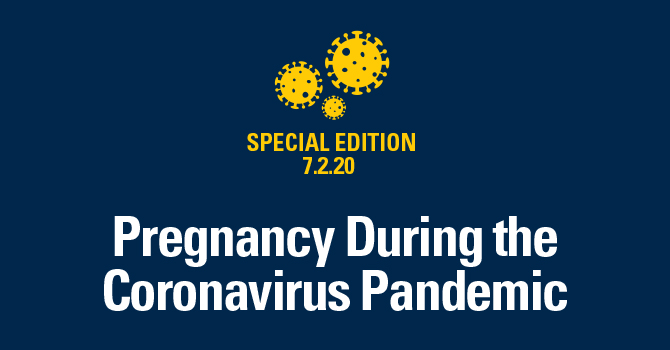Pregnancy During the Coronavirus Pandemic

In the United States alone, there’s an average of 4 million births each year. In the wake of the coronavirus pandemic, that amounts to a lot of women who are understandably concerned about their health and the health of their child.
In this episode we talked with Phoebe Kulik, a program manager at the University of Michigan School of Public Health and a first-time expectant mother, about what it’s been like to be pregnant during the coronavirus pandemic. To learn more about what we currently know about pregnancy and COVID-19, we also sat down with two experts in maternal health in the department of Epidemiology: Research Scientist, Miatta Buxton, and Associate Professor, Alexis Handal. They offered insights on the unique challenges the pandemic has had on expectant mothers, and what we can learn to provide better care.
Listen to "Pregnancy During the Coronavirus Pandemic 7.2.2020" on Spreaker.
|
Subscribe and listen to Population Healthy on Apple Podcasts, Spotify, Google Podcasts, iHeartRadio, YouTube or wherever you listen to podcasts! Be sure to follow us at @umichsph on Twitter, Instagram, and Facebook, so you can share your perspectives on the issues we discussed, learn more from Michigan Public Health experts, and share episodes of the podcast with your friends on social media. |
Kulik: In many ways, I'm experiencing the pandemic similarly to how other people are. I think the general concerns and stressors are many of the same. I’ve been worried about my family and struggling a little bit with being isolated for this long and missing normal routines. But in terms of the added layer of being pregnant, I'm especially missing that time with friends and family right now - not being able to hug them or have them feel the baby kick.
Nobody has the answers right now, so really all it comes down to is balancing the risk with what you need physically and emotionally as a pregnant mother and family. Now that things are starting to relax a little bit, we're not relaxing yet. We're still saying quarantined and only seeing a few certain people who are also quarantining. I think it's just important to ask questions whether it's of your doctor or seeking out reliable sources of information like from your health department or other reliable data sources, and just kind of equipping yourself with as much information as you can in order to weigh the risk and make a decision that will work for you. Especially, I think because this is a long-term issue. It's not passing quickly.
Speaker 1: You just heard Phoebe Kulik, she's a Program Manager at the University of Michigan School Public Health, andt she's also expecting her first child in the midst of the current pandemic. For Kulik and many other expectant moms, the coronavirus has brought a whole new set of challenges into an already difficult time. There's no guidebook for going through pregnancy, delivery, and the early months of parenthood during a global pandemic. That's why we wanted to learn more about the increased risks and unique challenges that the pandemic has had on expectant mothers.
Hello and welcome to Population Healthy, a podcast from the University of Michigan School of Public Health. This episode is part of a series of special editions of our podcast, focusing on the ongoing coronavirus pandemic. To learn more about pregnancy during the pandemic, we spoke to Dr. Miatta Buxton. She's an assistant research scientist at the University of Michigan School Public Health and an expert in maternal health. First, we asked her the basics. Is the coronavirus more dangerous for women who are pregnant?
Buxton: According to the Centers for Disease Control and Prevention, there are currently no evidence at this point that COVID-19 effects pregnant persons differently than others in a general population. Although preterm birth has been reported among pregnant women who were diagnosed with COVID-19, other factors such as the stress of being pregnant when you have shut down of major services and the many other associated financial or emotional challenges - the limited number of cases that we've seen of adverse outcomes among persons diagnosed with COVID-19, will make those adverse outcomes just anecdotal at this point.
The one thing we do know is that pregnant persons are at greater risk of severe outcomes such as hospitalization or adverse outcomes for the infant from other respiratory viruses compared to people who are that pregnant. So that gives us some sense of a potential, but at this point we do not know for sure.
Regarding whether COVID-19 can be passed from mother to child, there's no conclusive evidence at this point of vertical transmission of COVID-19 from mother to child. Vertical transmission is when you have the passage of virus from mother to baby, doing the periods either just before birth or after birth. There's also no evidence of transmission through breast milk. But we need to be mindful that there is a potential for true increased risk of transmission that may occur from mother to child if a mother is diagnosed with COVID-19.
One of the things I could potentially see going forward, even past the pandemic, is the widespread use of face masks, and this is something that could be used during breast feeding for other times when there's no COVID-19. So, when we have flu season, that's another time when transmission can happen just from the fact that the mother is so close to her baby that she could transmit influenza to her baby. Just this new way of thinking that “oh, I can wear a face mask and reduce the chance of spreading flu to my baby” is something that I think people will be thinking about.
Speaker 1: Hospitals and providers have had to make many changes during the pandemic. And while there may be no current evidence to indicate that pregnant women are more likely to contract coronavirus than anyone else, it's still important to take precautions.
Buxton: To date, hospitals and clinics have taken additional measures to protect their patients. One of them being that patients are screened for symptoms. Another one is that providers are utilizing telemedicine for prenatal care. This allows for easier access for patients to communicate and receive care from the doctors and it reduces in the end the number of persons who have to be at a hospital, health center, or clinic during a given time.
In such cases when patients do not have lab work required or if they don't have a physical exam, and if they are considered low risk they can use telehealth services in the form of telephone interaction with the doctor or they can also have video conference to meet with their provider. But there are pregnant women who are considered to have high risk pregnancy or who are closer to their due date. For these subsets of pregnant persons, it will be encouraged, in general, to attend in person visits so that they can be closely monitored.
This use of telemedicine, it could potentially be extended going forward to ensure that people with low risk pregnancies make all of their prenatal visits. So sometimes due to scheduling, sometimes due to a need for transportation, people don't make it to all of their required prenatal visits. With telemedicine now an option and if the insurance companies will consider covering this going forward, then some prenatal visits could be scheduled by way of a telephone call or by video conference. That way providers can ensure that pregnant women attend almost all of the prenatal visits.
Speaker 1: Alexis Handal is an Associate Professor of Epidemiology at the University of Michigan School of Public Health. For the past 15 years, she's been involved with projects studying environmental and occupational epidemiology as it relates to maternal health and child development. Her current research includes Project Semilla, an Ecuador based study that monitors potential exposures in a group of pregnant women and infants. Though it started before the start of the coronavirus pandemic, Project Semilla is now well-positioned to give valuable insights about the effects of the pandemic on women and children.
Handal: Semilla follows pregnant women and their infants up to 18 months of age. Our methods include obtaining monthly prenatal urine samples to assess biomarkers of pesticide exposures and maternal and neonatal blood samples to assess thyroid hormone levels. At each visit throughout the study, we collect detailed data on important social and structural factors, including working conditions, environmental exposures in the home and at work, measures of stress, social support, interpersonal violence, depression, family conflict, maternal health and lifestyle, social, economic and demographic factors.
Generally speaking, maternal stress during pregnancy has been shown to impact the development of the fetus and the baby. And there's really a very solid body of evidence demonstrating associations between maternal stress and poor pregnancy and birth outcomes. It also has been linked with developmental issues in the baby such as learning and attention difficulties, for example. Mothers who experience stress during pregnancy are also at a higher risk of developing postnatal depression and anxiety, which also has an adverse impact, not just on her health, but on her babies and her family's health. And we know from our previous studies that the levels of stress that these women experience normally is already high. Even before the pandemic, our study focused on measuring and assessing maternal stress.
I think it is important to say that this has been an unprecedented situation for the world, of course, and for Ecuador and for our study and the participants in our study. We have seen impacts in a variety of ways that have caused us to have to rethink how we are going to do recruitment, how we're going to collect data, what are the questions we’re going to ask. In April when this was all happening in terms of the pandemic, we quickly developed and conducted a qualitative interview with our currently enrolled participants specifically asking them about how the pandemic has impacted them during their pregnancy, and also for a few of the participants who had delivered already, how it has impacted their delivery and postpartum experiences. We wanted to know how the pandemic has impacted the economic situation for her family, how the relationships at home have changed, how her role has changed in the home, and also what her concerns are for the future.
And what the participants shared with the team during those interviews was that the pandemic has caused an incredible amount of uncertainty and stress. The Ecuadorian flower industry, which has been the dominant economic contributor in the region since the 1980s, has been greatly impacted by the pandemic and many flower workers and others have lost their jobs. This has brought about economic insecurity for the families, and associated with that comes food insecurity, which is another critical form of stress for the pregnant woman and her baby and her family.
Additionally, the relationships at home have been further strained. We know from other studies around the world that the stay-at-home measures put into place to control the pandemic have been linked to increases in interpersonal violence. This is no exception with our participants. Participants also discussed the stress related to the added responsibility of taking care of the family and the home, as well as the schooling of their other children. The participants also discussed the added worry about getting infected during their pregnancy and their partners and other loved ones getting infected.
Ecuador has been fairly hard hit by the pandemic, and initially they put into place a fairly strict quarantine measure for everyone to stay in their homes. So because of the strict quarantine, the women were not going out for their normal prenatal or postnatal care check-ups. And then even when the government relaxed some of those measures so as to allow women to go to their medical appointments, many expressed being worried about contracting the virus. Others did not have any transportation to get to their appointments, since public transportation was halted during the quarantine period. For those women that were living far from the urban centers or the clinics, especially, it was practically impossible for them to get to their health check-ups without public transportation. Public transportation has resumed now, so that's helped alleviate some of those issues, but the fear of contracting the virus remains.
I think it's important to note that the COVID-19 pandemic has only exacerbated the existing challenges that we face when it comes to maternal health. For countries where health systems were already struggling or facing challenges, such as in Ecuador, the pandemic has made the health care systems weaker. And we have witnessed this in the United States as well, it's not just in places such as Ecuador.
Speaker 1: There can be a lot of fear, especially from first time parents, when it comes to the birth of a child. Let's go back to Dr. Miatta Buxton, and some suggestions for ways expectant parents can empower themselves to feel safer and protect their babies.
Buxton: The general advice to pregnant persons is that they should proceed with caution and take the necessary public health measures to reduce their risk of contracting COVID-19. Expectant mothers should be very mindful about who they come in contact with, especially for example if they have other kids, And they should be mindful about informing those people to use public health measures, such as proper hand washing when they are exposed to them.
I think the way to safely proceed in this difficult time is to just almost operate as if you already have coronavirus. If you suddenly become exposed and you do have it, you are already doing what you should be doing anyhow. So by the time you find out you have it, at that point you wouldn't have to be suddenly adjusting before your child has already been exposed.
The impact of being pregnant during this pandemic, wondering what is going to happen to me, wondering what's gonna happen to my baby, of course, at the same time while dealing with potential job losses, financial challenges, really lead to increased stress and really make pregnancy a huge challenge for a mother.
I understand that you are nervous. So first thing, I would acknowledge that it's okay to be nervous. But then I would also like to tell her there are things that you can do to empower yourself. Again, practice the public health measures that have been recommended for yourself, but also be mindful about who you're exposed to. And it's okay to speak out and let people know that you need to take extra precautions because you need to be healthy for you and your child.
The other thing I would recommend is, be proactive in seeking out support or the services that you need. Talk to your doctor, talk to the nurses at your doctor's office and see what they're recommending, because I think part of it is if you're proactive, then you don't get truly overwhelmed with anything that could potentially pop up.
So, I think being proactive and seeking out information and seeking out the services that you need will be something also that will help alleviate some of the stress. Talking to people and definitely making known your concern, because if you're just internalizing that it eventually gets to you. So making known your concerns, seeking out information, and being proactive are some of the things I would say to a person who is pregnant right now and rightfully concerned about their well-being and the well-being of their baby.
Speaker 1: This has been a special edition of Population Healthy, a podcast from the University of Michigan School of Public Health. During the ongoing coronavirus pandemic, we’ll work to bring you analysis from our community of experts to help you understand what this public health crisis means for you. To stay up-to-date in between special edition episodes, be sure to check out our website publichealth.umich.edu, subscribe to our Population Healthy newsletter at publichealth.umich.edu/news/newsletter and follow us on Twitter, Instagram, and Facebook @umichsph.
In This Episode
 Phoebe Kulik
Phoebe Kulik
Director of Workforce Development, Region V Public Health Training Center, University of Michigan School of Public Health
Phoebe Kulik has a master’s of public health in Health Behavior and Health Education from the University of North Carolina at Chapel Hill. Currently, she is the Program Manager for the Certificate in Population Health and Health Equity at the University of Michigan School of Public Health, as well as the Director of Workforce Development at the Region V Public Health Training Center, and Training Manager for the National Center for School Safety.
 Miatta Buxton
Miatta Buxton
Assistant Research Scientist, Epidemiology
Dr. Miatta Buxton studies environmental and other influences on maternal and child
health that contribute to adverse pregnancy outcomes. Her current work focuses on
evaluating the role of air pollution and dietary factors on inflammation patterns
during pregnancy and their relation to pregnancy outcomes.
Learn more.
 Alexis Handal
Alexis Handal
Associate Professor, Epidemiology
Dr. Handal’s research interests include environmental and occupational epidemiology,
reproductive epidemiology, and child health and development examined within social,
political, and economic contexts, and in global settings. Her work focuses on populations
who are traditionally underrepresented in research, including Latinx and Indigenous
populations in the U.S. and Latin America and those who are most exposed to hazardous
work conditions and environmental toxins. Her community-engaged research approach
uses a health equity lens focusing on the interconnection between occupation, stress,
toxic exposures, and difficult social environments on maternal health and child development.
Learn more.
